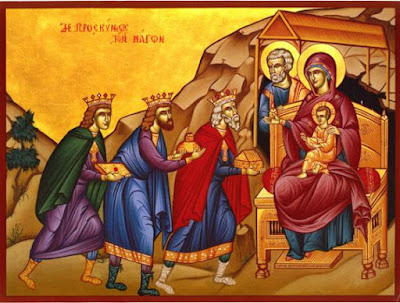What strikes more in today’s gospel is the
different attitude of its characters towards Jesus. On the one hand, we see
some wise men from the East looking for the king of the Jews. They come from
afar; they belong to another people; they profess another religion. Why should
they be concerned with the king of an alien and minor people without any
connection with them? And yet, after seeing a star, they leave their country
towards Judea; they undergo the discomforts of a long journey to pay homage to
the king of the Jews and offer him their gifts.
On the other hand, we encounter the Jews, who
get troubled when they learn of the birth of their king. It was ages that they
were waiting for his coming; their Scriptures spoke of him. And now that
someone tells them that he has been born, they are disturbed. And as if that was
not enough, Herod, their incumbent puppet king, orders the massacre of all the
male children in Bethlehem and its vicinity. Why? Evidently, he feels
threatened by that Infant: he could oust him from his position of power; so, he
must die.
This story teaches us that geographical
closeness or ethnic and cultural affinity with Christ is not enough; affiliation
is not a guarantee of salvation. One is not saved just because belongs to the
people of Jesus. There is need of recognizing him and doing him homage.
Scriptures can be a help; but they also are not enough. Herod does not even
know what the Scriptures say about the Messiah. He has to ask the experts; and
even when they tell him what is written about the Messiah, that is not enough.
Indeed, he will use that information not to worship him, but to get rid of him.
On the contrary, people who had nothing to do with the Jews, who did not know
the Scriptures speaking of the Messiah, with no other guidance but a star, they
look for the king of the Jews, they find him, they adore him: “They prostrated themselves and did him homage” (procidentes adoraverunt eum).
This story is a foretaste of what will happen
at the end of Jesus’ earthly life: when the apostles start preaching the
gospel, their announcement will be refused by the Jews and welcomed by pagans.
Somehow, the Magi are the first fruits of the Gentiles who will recognize
Christ as their Savior. This is the mystery of the Epiphany, of which Paul
speaks in the second reading; the mystery hidden for ages and now revealed to
us: “that the Gentiles are co-heirs, members of the same body, and co-partners
in the promise in Christ Jesus through the gospel.” All without distinction are
called to salvation. Salvation is a gift at everyone’s disposal. The only
requirements are: to look for it and, once found, accept it.
The same story repeats itself over the
centuries, up to the present day. It would seem that nowadays those near, those
who belong to once-Christian nations, either ignore or fear or even refuse and
oppose their King. At the same time, we see people coming from afar, who find
in Christ their Savior, the fulfillment of their expectations. Jesus lets
himself be found by those who look for him. Those who ignore him, he abandons
them to self-indulgence, so that they may destroy themselves by their own
hands.
Let us imitate the Magi; let us set out in
search of the king of the Jews; let us search his signs in the world and in the
Scriptures; let us follow his star. And when we find him, let us prostrate
ourselves before him, and let us adore him. He is our Lord, our Savior and
King.
Q
